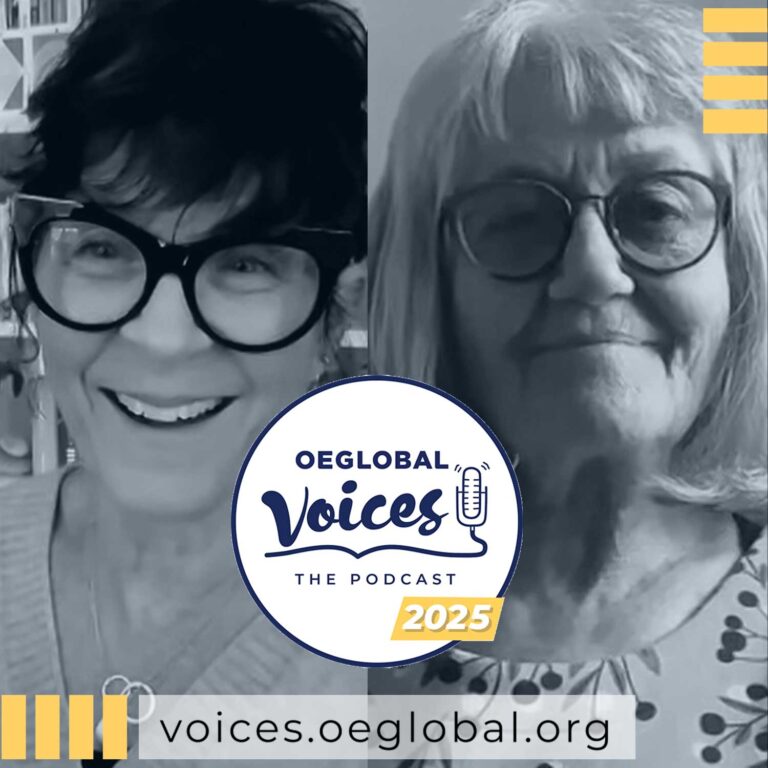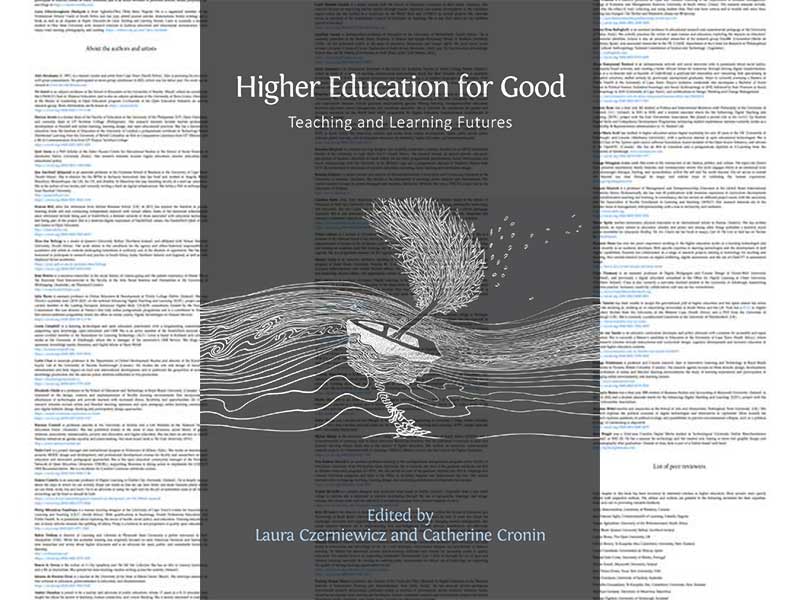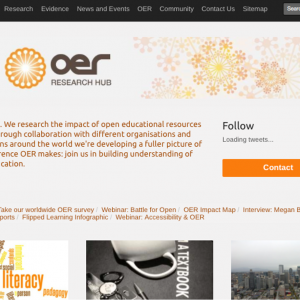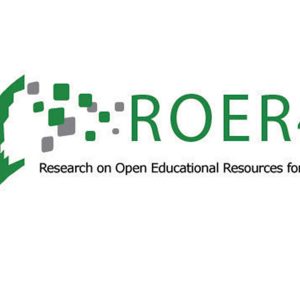This is a recognition specifically for all of the listed editors, authors, artists and peer reviewers of Higher Education for Good: Teaching and Learning Futures.
The timing of this work born into the turmoil and unsettling of the global pandemic but also on the backdrop of continued social upheaval, neoliberalism, and seemingly eroding of the values of open education make a strong case for it’s purpose not just being as to raise a flag for hope, but also to generate action towards addressing these issues. This was very well evident in the OER24 keynote “The future isn’t what it used to be: Open education at a crossroads” by its co-editors that was not a celebration of a published open work, but again, a call for cooperation and action going forward.
This award goes to 118 people
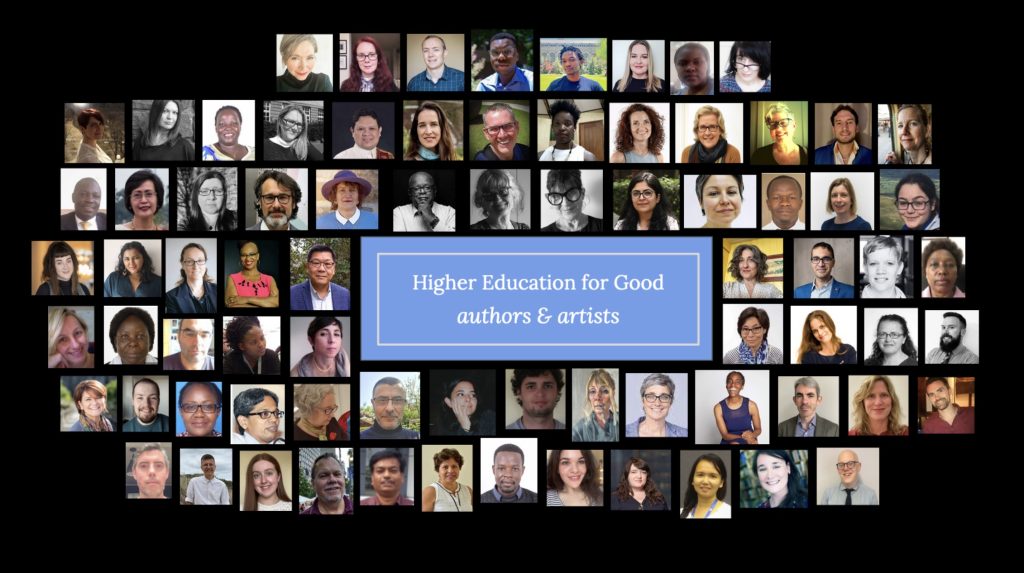
79 Authors and Artists
Alex Abrahams, Tel Amiel, Patricia Arinto, Jyoti Arora, Jess Auerbach Jahajeeah, Frances Bell, Dina Zoe Belluigi, Kate Bowles, Julie Byrne, Lorna Campbell, Leslie Chan, Elizabeth Childs, Raewyn Connell, Paola Corti, Eamon Costello, Philip Mbulalina Dambisya, Robin DeRosa, Maeve A. Devoy, Janaina do Rozário Diniz, Amber Donahue, Flora Masumbuo Fabian, Tim Fawns, Sharon Flynn, Giulia Forsythe, Primo G. Garcia, Mona Ghali, Brenna Clarke Gray, Carolina Guzmán-Valenzuela, Jonathan Harle, Carol Hordatt Gentles, Jonathan Jansen, Jonny Johnston, Perpetua Joseph Kalimasi, Su-Ming Khoo, Benedict Khumalo, Rehema Kilonzo, Caroline Kuhn, Gloria Lamaro, Tamara Leary, Rob Lowney, Jim Luke, Albert Luswata, Felicitas Macgilchrist, Sheila MacNeill, Eimer Magee, Mpine Makoe, Ana Katrina Marcial, Niamh McArdle, Kyla McLeod, Sanjaya Mishra, Pradeep Kumar Misra, Kate Molloy, David Moloney, David Monk, Morag Munro, Lou Mycroft, Chrissi Nerantzi, Edwin Ngowi, Juuso Henrik Nieminen, Femi Nzegwu, Fernandos, Ekaterina (Katya) Pechenkina, Judith Pete, Paul Prinsloo, Juliana Elisa Raffaghelli, Aleya Ramparsad Banwari, Jasmine Ryan, Anne-Marie Scott, George Sfougaras, Damary Sikalieh, Sherri Spelic, Suzanne Stone, Clare Thomson, Vicki Trowler, Kristin van Tonder, George Veletsianos, Michaela Waters, Andreas Wittel, Kyle Wright
36 Peer-Reviewers
Ishan Abeywardena, Jane-Frances Agbu, Najma Aghardien, Ibrar Bhatt, Carina Bossu, Cheryl Brown, Linda Castañeda, Manuel Joāo Costa, Alison Farrell, Jairo Fúnez-Flores, Peter Goodyear, Himasha Gunasekara, Sandhya Gunness, Melissa Highton, Phil Hill, Mandy Hlengwa, Cheryl Hodgkinson-Williams, Petar Jandrić, Christopher Knaus, Allison Littlejohn, Tristan McCowan, Gita Mistri, Erick Montenegro, Marcela Morales, Hoda Mostafa, Simbarashe Moyo, Jackline Nyerere, Larry Erhuvwuoghene Onokpite, Luci Pangrazio, Rubina Ramparsad, Shikha Raturi, Jen Ross, Bonnie Stewart, Marwan Tarazi, Melody Viczko, Ben Williamson
3 Editors
Catherine Cronin, Laura Czerniewicz, Larry Erhuvwuoghene Onokpite
About Higher Education For Good
After decades of turbulence and acute crises in recent years, how can we build a better future for Higher Education?
Thoughtfully edited by Laura Czerniewicz and Catherine Cronin, this rich and diverse collection by academics and professionals from across 17 countries and many disciplines offers a variety of answers to this question. It addresses the need to set new values for universities, trapped today in narratives dominated by financial incentives and performance indicators, and examines those “wicked” problems which need multiple solutions, resolutions, experiments, and imaginaries.
About Higher Education for Good
This mix of new and well-established voices provides hopeful new ways of thinking about Higher Education across a range of contexts, and how to concretise initiatives to deal with local and global challenges. In an unusual and refreshing way, the contributors provide insights about resilience tactics and collective actions across different levels of higher education using an array of styles and formats including essays, poetry, and speculative fiction.
With its interdisciplinary appeal, this book presents itself as a provocative and inspiring resource for universities, students, and scholars. Higher Education for Good courageously offers critique, hope, and purpose for the practice and the trajectory of Higher Education.
See also
- Higher Education For Good: curating a cohesive book (Laura Czerniewicz blog)
- HE4Good editorial principles: heterogeneity, care, and community (Catherine Cronin blog)
It seems evident in the representational breadth of authors, the multimodality of their expression, but more so, in the stories of what went into the creation of this work, this is a definitive example of global, open collaboration purposefully driven.
Award Nominator
The book fosters collaboration among individuals from around the globe, particularly amplifying unprivileged voices and promoting socially just perspectives. As an open-access book, it fully supports the exchange of ideas facilitated by technology. Its journey of collective hope and positive imagining is driven by the extensive representational breadth of the authors and the multimodal perspectives and stories they share in this work.
Award Reviewer
This collaboration is a great example of how a large multinational group of people can come together to create an open resource that makes a case for open education and its power to transform higher education (and by extension, society) for the better. The scale of this collaboration and the breadth of topics addressed are impressive.
Award Reviewer
Explore more about this awardee…
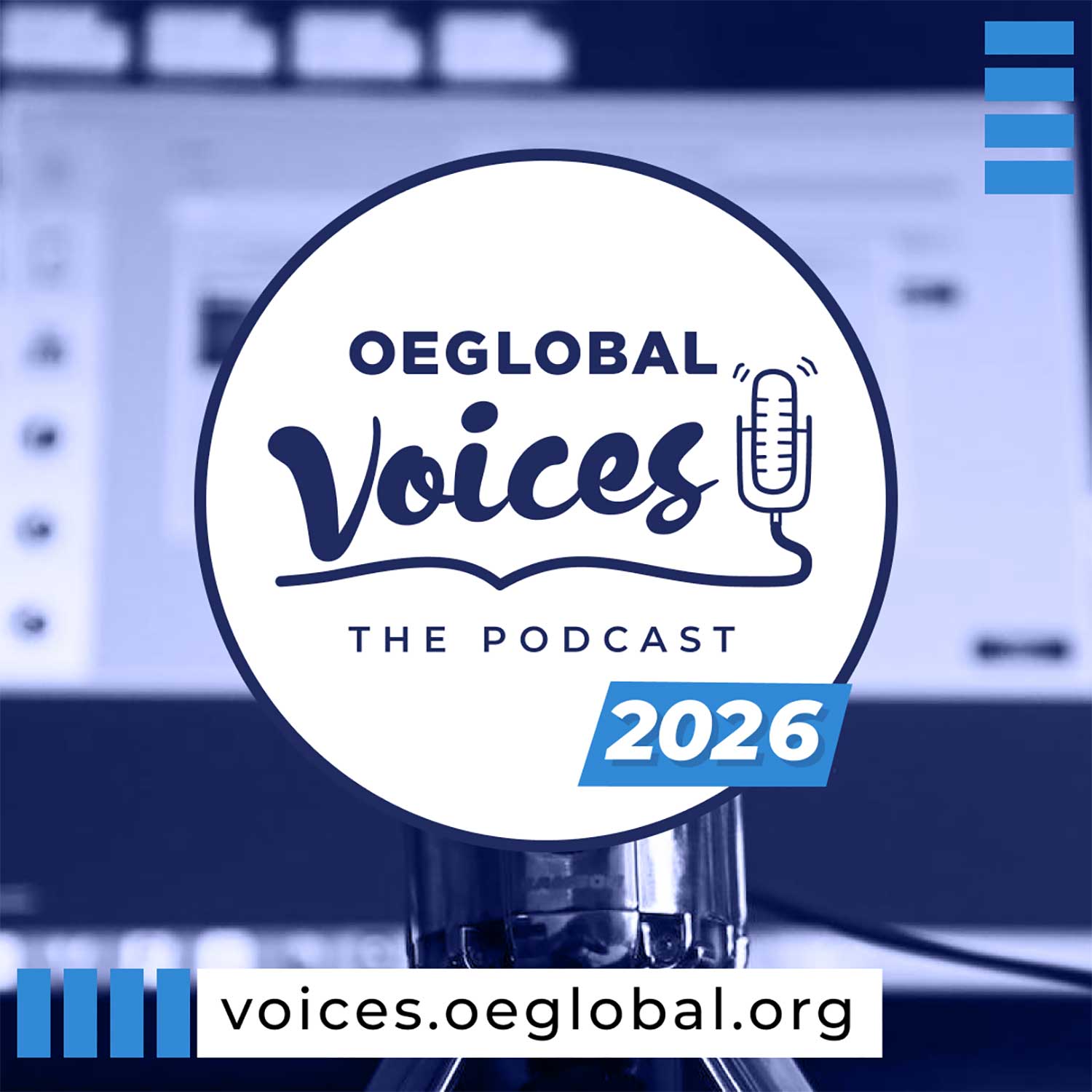
Podcasts from Open Education Global
Join us for our newest podcast episode, with voices connecting open educators from distant locations, both by the sea, Laura Czerniewicz from the southern tip of South Africa and Catherine Cronin from the west edge of Ireland. Listening to these two influential forces in open education, you should feel like you are in one room together.
Recorded in September 2025, we invited Laura and Catherine to reflect on their multiple recognitions in the 2024 Open Education Awards for Excellence. Catherine was awarded in the area of leadership and both our guests were part of the entire team recognized for the global collaboration that produced Higher Education for Good. We hear about ongoing efforts that came from their subsequent keynote presentations as calls to action to critically address Open Education “at the crossroads.” In many threads you will understand how both Laura and Catherine embody, in a most human fashion, both leadership and collaboration.
There’s much to be inspired by in hearing Laura and Catherine’s share stories of their influences, experiences, and mostly, the optimism that comes from witnessing how their vision for Higher Education for Good came to be openly created and shared.

at Descript.com
In This Episode
FYI: For the sake of experimentation and the spirit of transparency, this set of show notes alone was generated by the AI “Underlord” in the Descript editor we use to produce OEGlobal Voices.
Reflections on Leadership, Collaboration, and Open Education with Laura Czerniewicz and Catherine Cronin
In this episode of OEGlobal Voices, host Alan Levine catches up with Laura Czerniewicz and Catherine Cronin. The conversation reflects on their journeys in open education, touching upon leadership, humanity, and courage. They discuss their collaboration on the book ‘Higher Education for Good,’ recognized with multiple awards, and share personal stories from their pasts, including their childhoods and educational backgrounds. The discussion also explores the evolving landscape of open education, the impacts of big tech, and the importance of maintaining a human-centered approach. The episode closes with a reflection on community, personal well-being, and the joys of life outside work.
- 00:00 Intro Music and Highlighed Quotes
- 01:14 Podcast Introduction
- 02:05 Reflections on Leadership and Awards
- 04:52 Personal Histories and Early Influences
- 10:47 Challenges and Changes in Open Education
- 20:49 Higher Education for Good: Collaboration and Impact
- 26:34 Current Projects and Personal Reflections
- 41:01 Closing Remarks and Future Plans
(end of AI generated show notes)
Additional Links and Quotes for Episode 93
We know that in the midst of the chaos and collapse, there are people doing good things and soldiering on. That’s still true today. When we had this conversation about this possibility, that is exactly what we hoped for, that we would capture that dogged insistence on doing good in the face of what might feel intransigent obstacles.
And it happened. It’s amazing and astonishing and bigger than we ever thought, but it’s a real celebration of the fact that, in the midst of everything and something we have to all remind ourselves now, when we watch what’s going on in the world, that there are good actions and people, no matter what.
Laura Czerniewicz on Higher Education for Good
- Catherine Cronin (web site)
- Open Educational Practices for Good (2024 presentation at Lehman College)
- Laura Czerniewicz (web site)
- 2024 OEAwards Individual Award for Leadership (OEGlobal)
- Centre for Innovation in Learning and Teaching (University of Cape Town)
- Higher Education for Good- Teaching and Learning Futures (Open Book Publishers)
- 2024 OEAward inCollaboration to All People Behind Higher Education for Good (OEGlobal)
- Open Book Publishers (publisher)
- The Future Isn’t What It Used to Be: Education at the Crossroads (OER24 keynote )
- Open Education at a Crossroads (Open Education Conference 2024)
- Addressing Challenges to Open Education in an Era of Authoritarianism and Big Tech (OTESSA 2025 keynote)
- Catherine Cronin and Laura Czerniwicz on HE for Good (Helen Beetham podcast)
- Review of Laura Czerniewicz and Catherine Cronin (Eds.). (2023). Higher Education for Good: Teaching and Learning Futures (Helen Beetham in Postdigital Science and Education)
- Dear Photograph
- Soweto uprising (1976 South Africa)
- Cheryl Hodgkinson-Williams (University of Cape Town)
- Zohran Mamdani (Wikipedia)
- OEGlobal Voices 082: Amanda Coolidge, Marcela Morales, and Maren Deepwell on “The Small Things”
- OER19 Conference in Galway, Ireland, Recentering Open: Critical and Global perspectives
- Maria Ressa (Wikipedia)
- Avoiding Whatsapp as a political act (first of four part series, Laura Czerniewicz blog)
And this sounds simple, but you don’t see it everywhere. It’s increasingly obfuscated and not mainstream. For me, it’s very sad. I think that we need more courageous leadership that respects humanity, that holds hope, that can paint a vision so people can see the difference from where we are now to what might be, what could be, more humane and socially just futures.
And then help and encourage people to step towards that. So I dunno how I got there, but that’s my raw thoughts about leadership today.
Catherine Cronin on leadership
Listen to more of our episodes recorded with Open Education Awards for Excellence winners.
Our open licensed music for this episode is a track called Hopeby Xennial that is shared under a Creative Commons Attribution license.Like most of our podcast music, it was found at the Free Music Archive (see our full FMA playlist).
